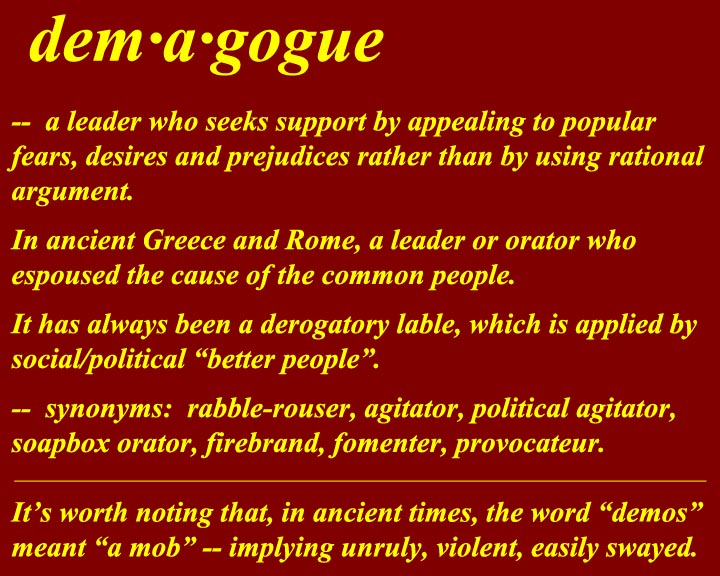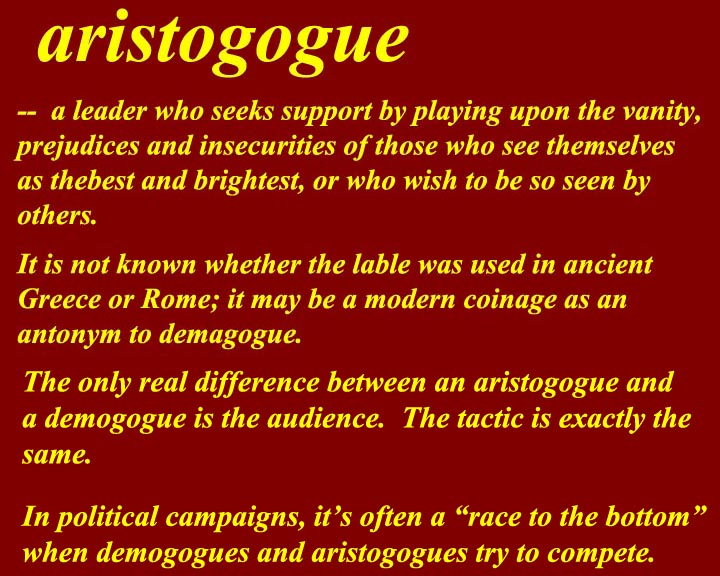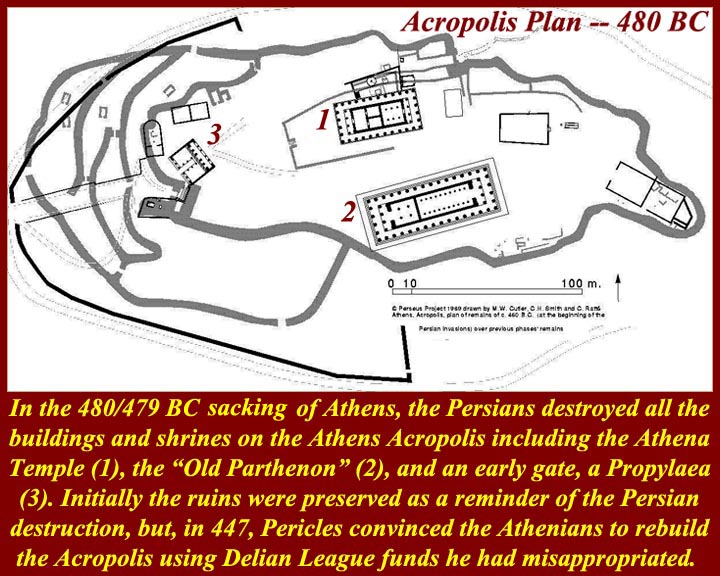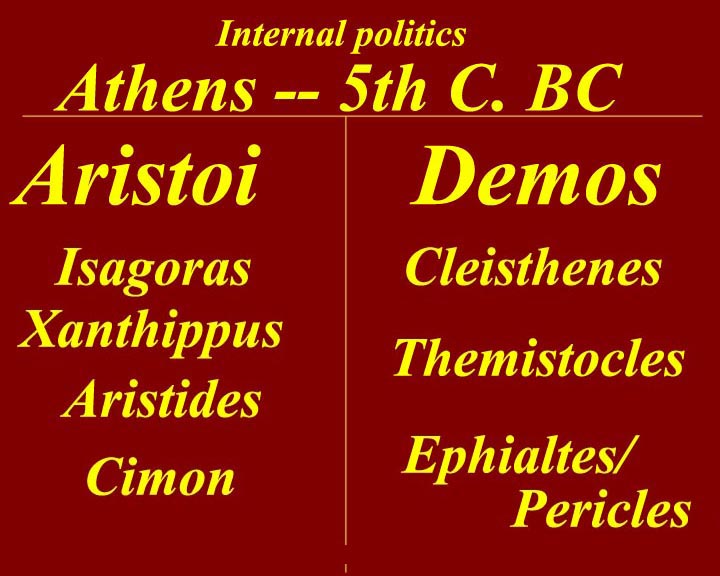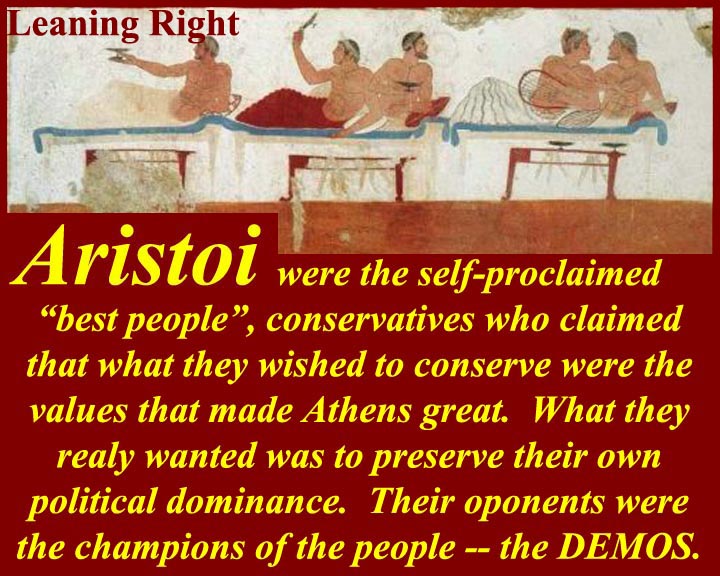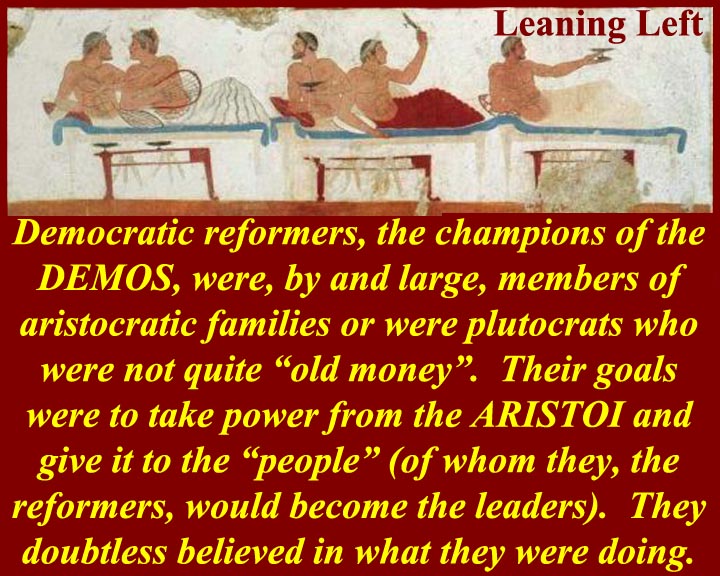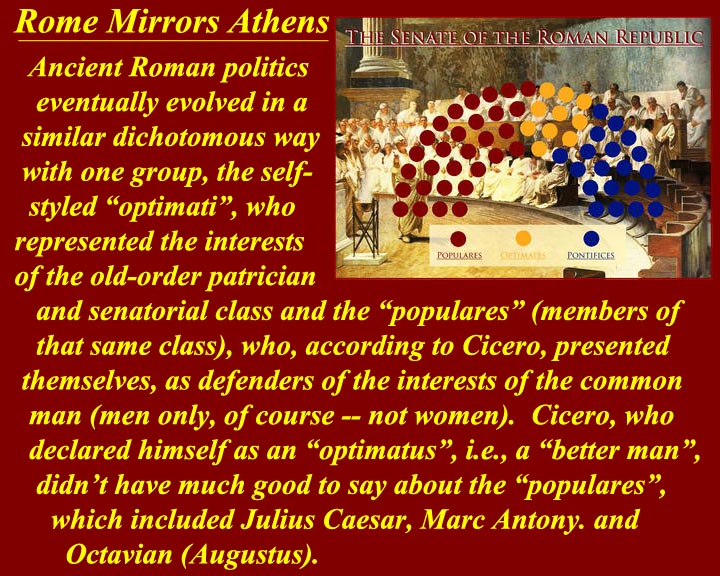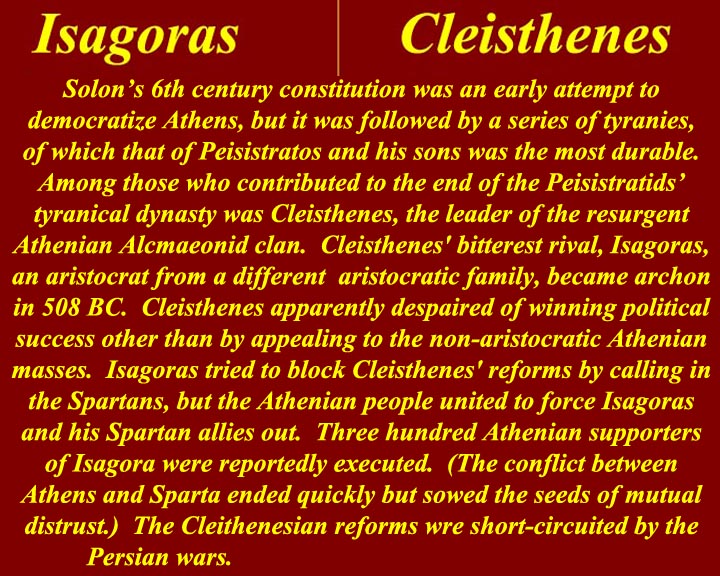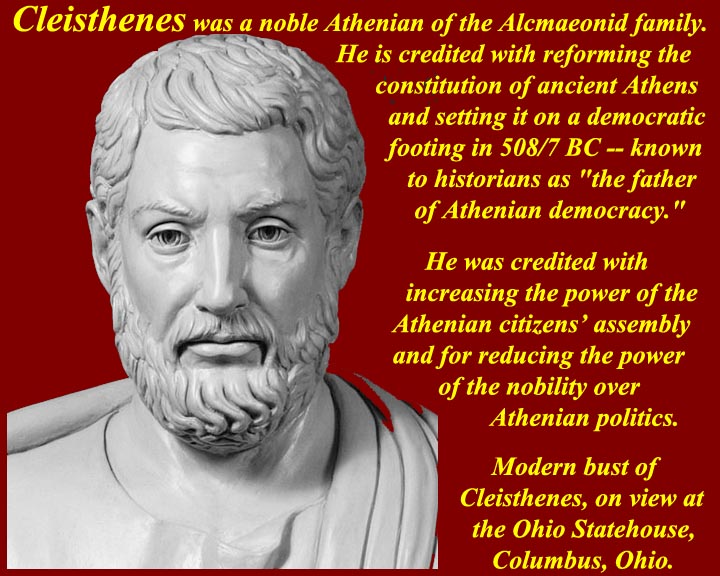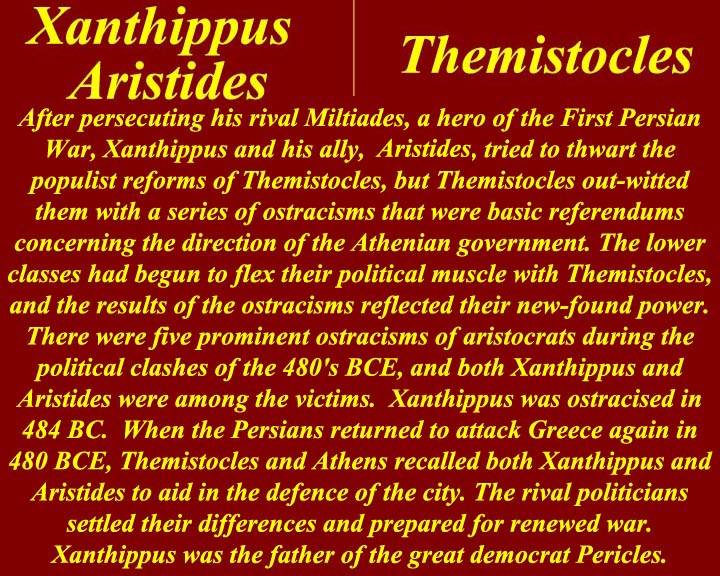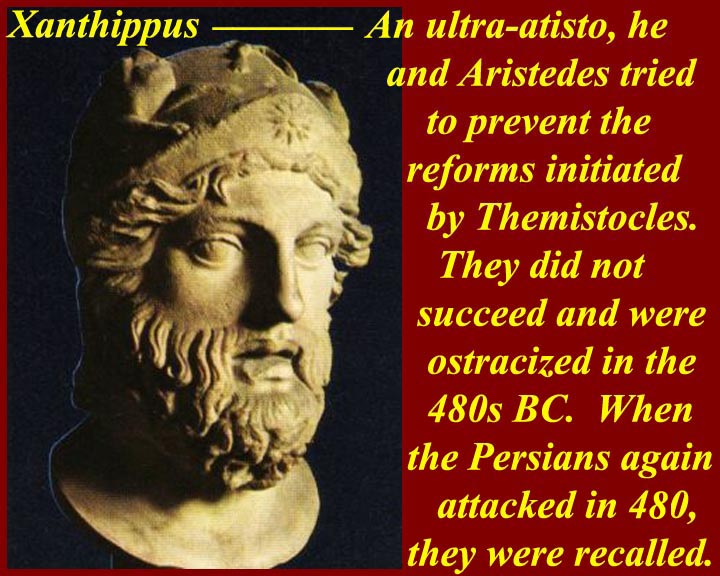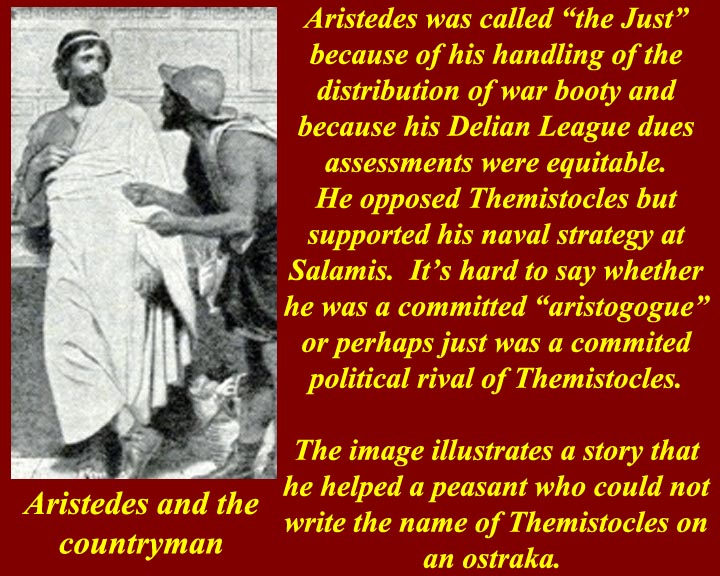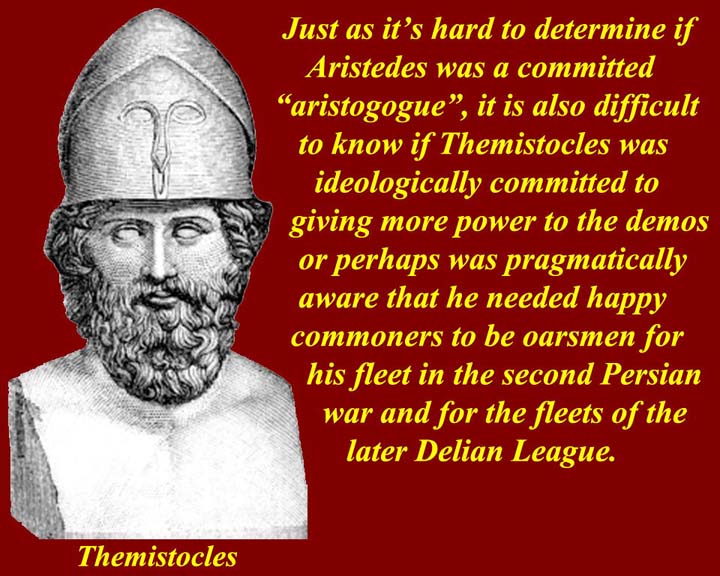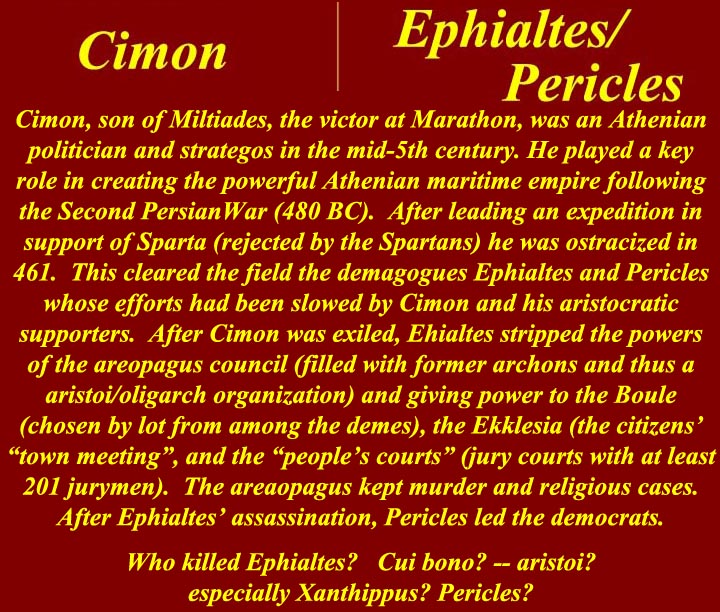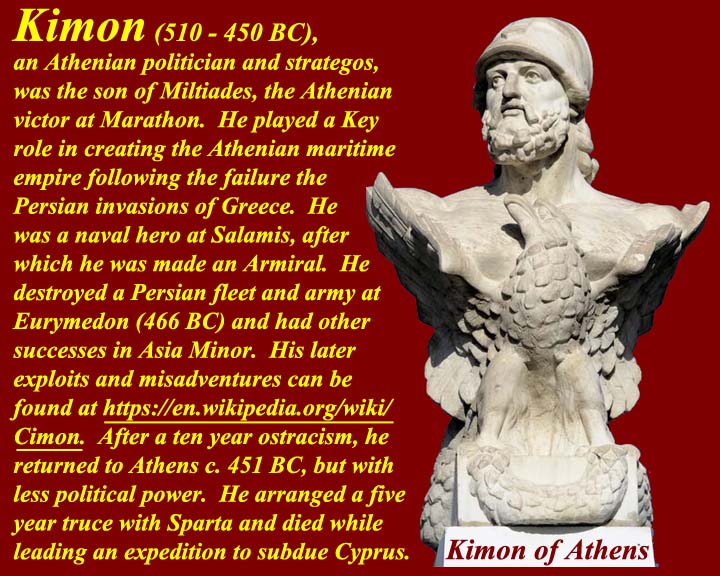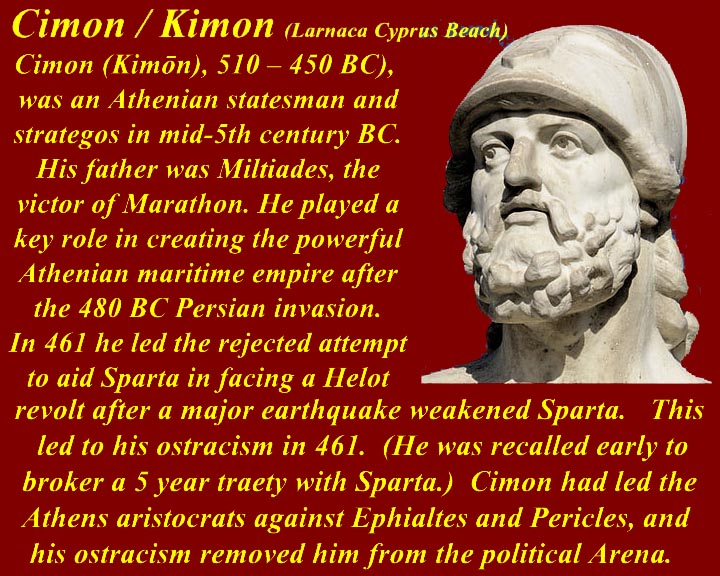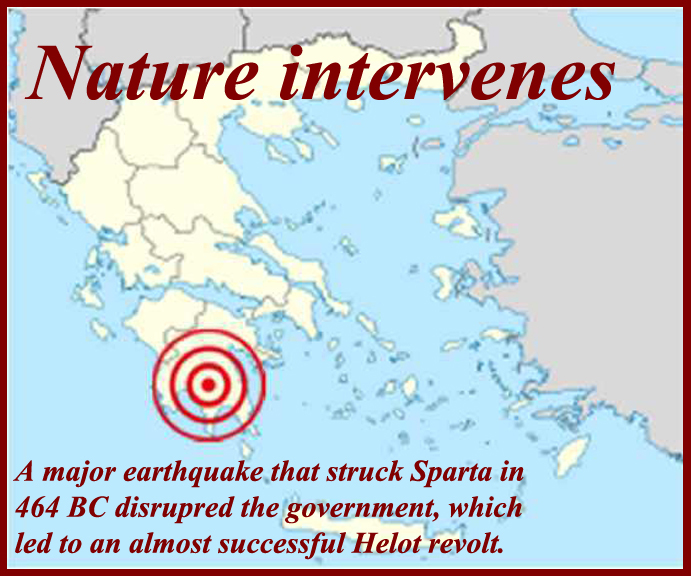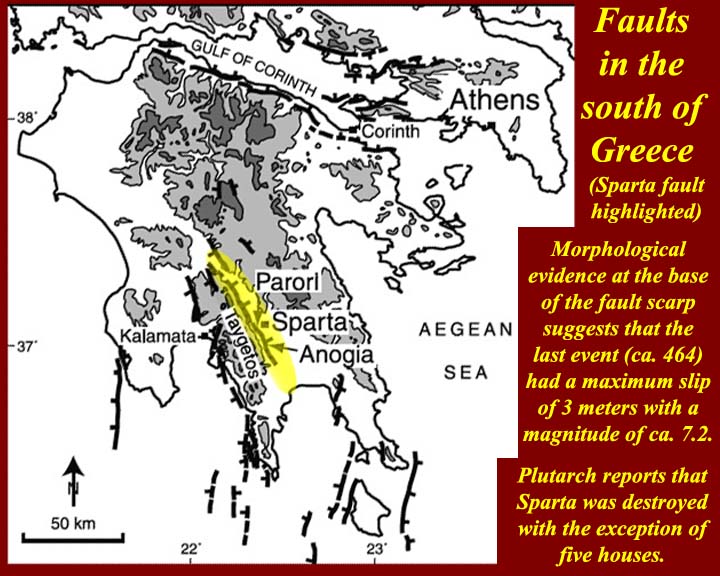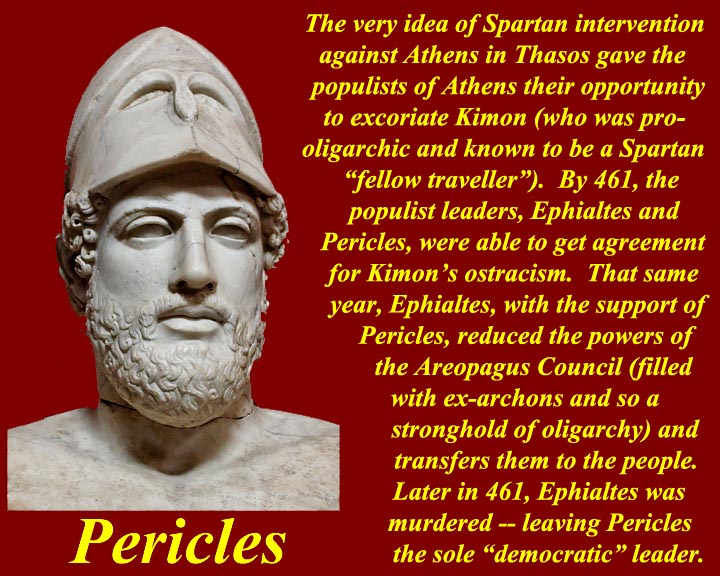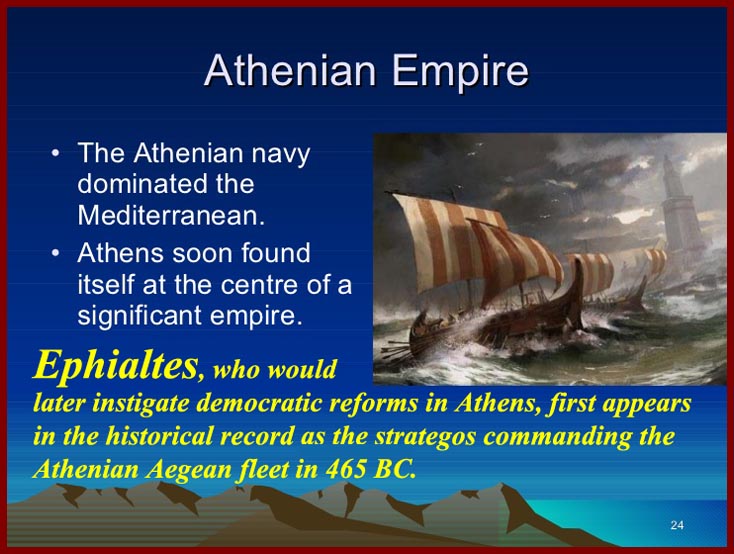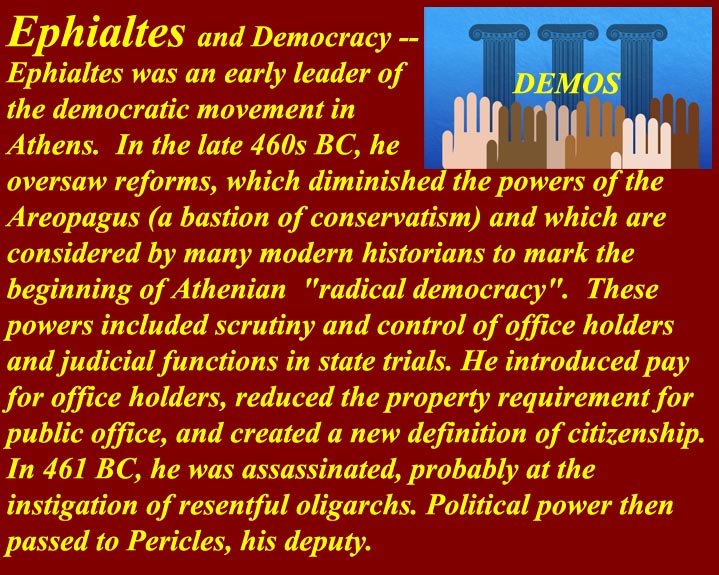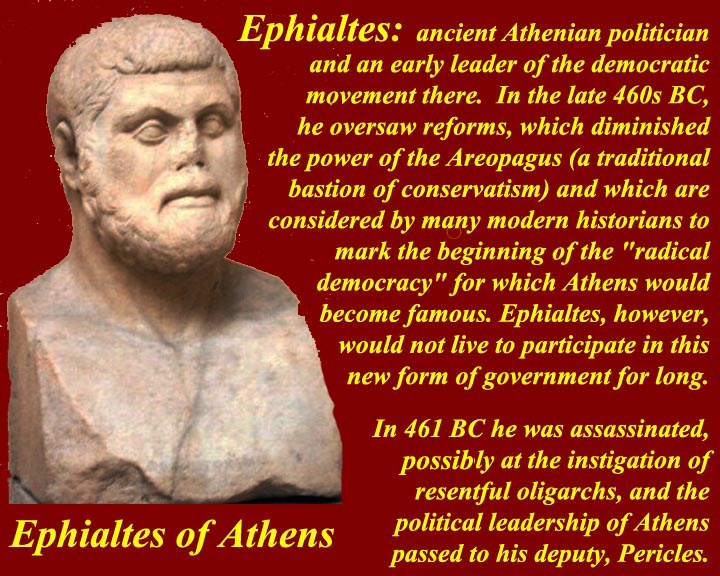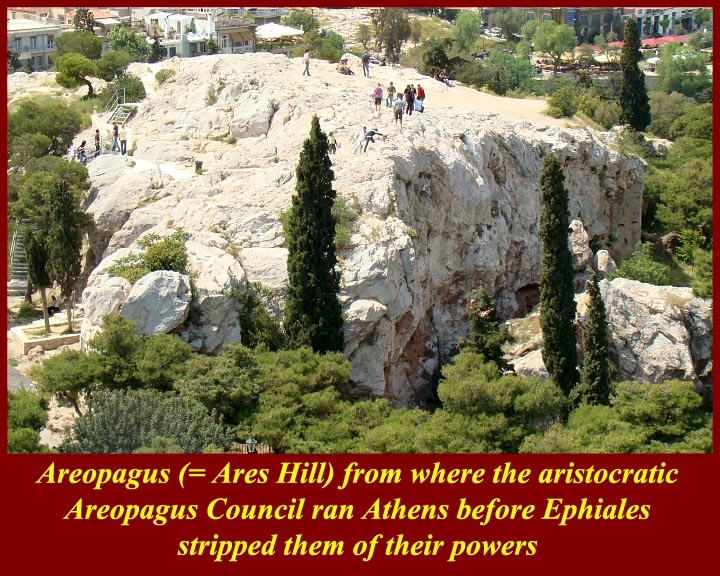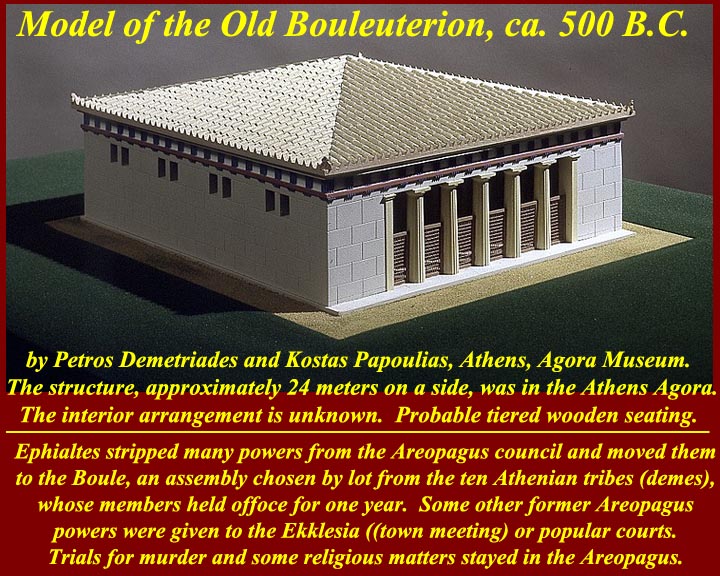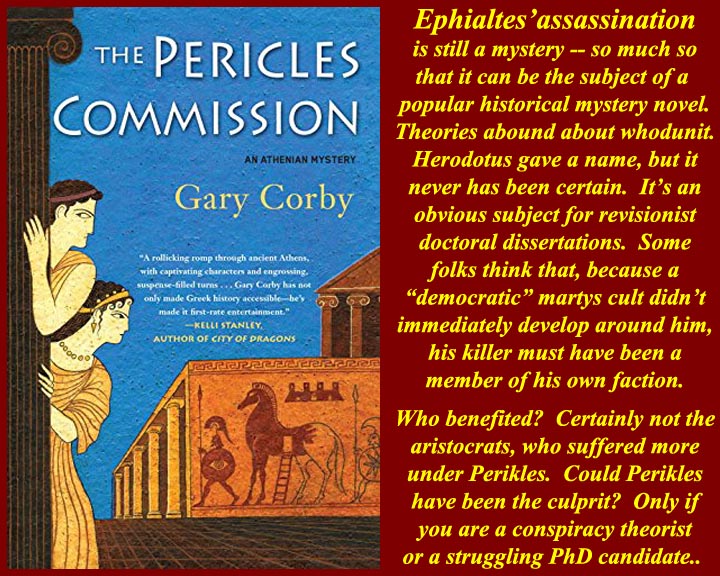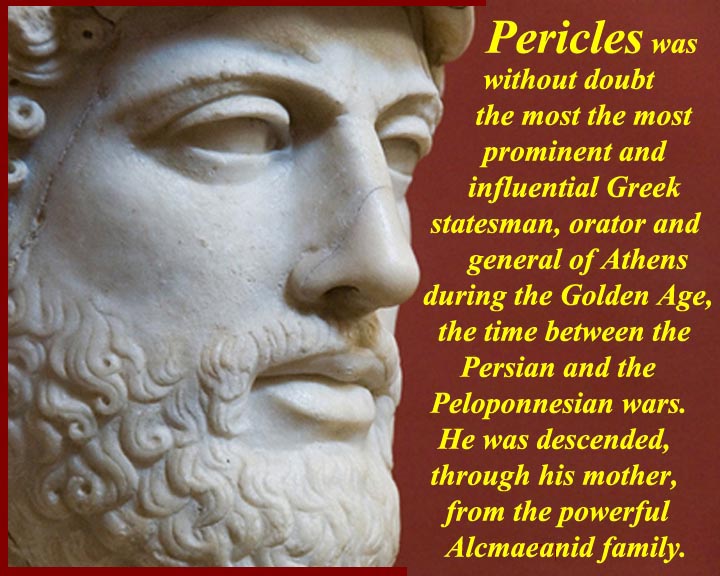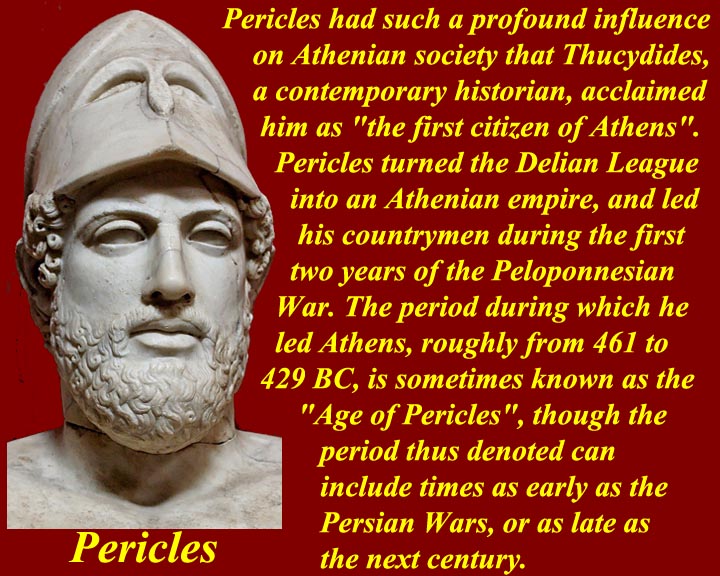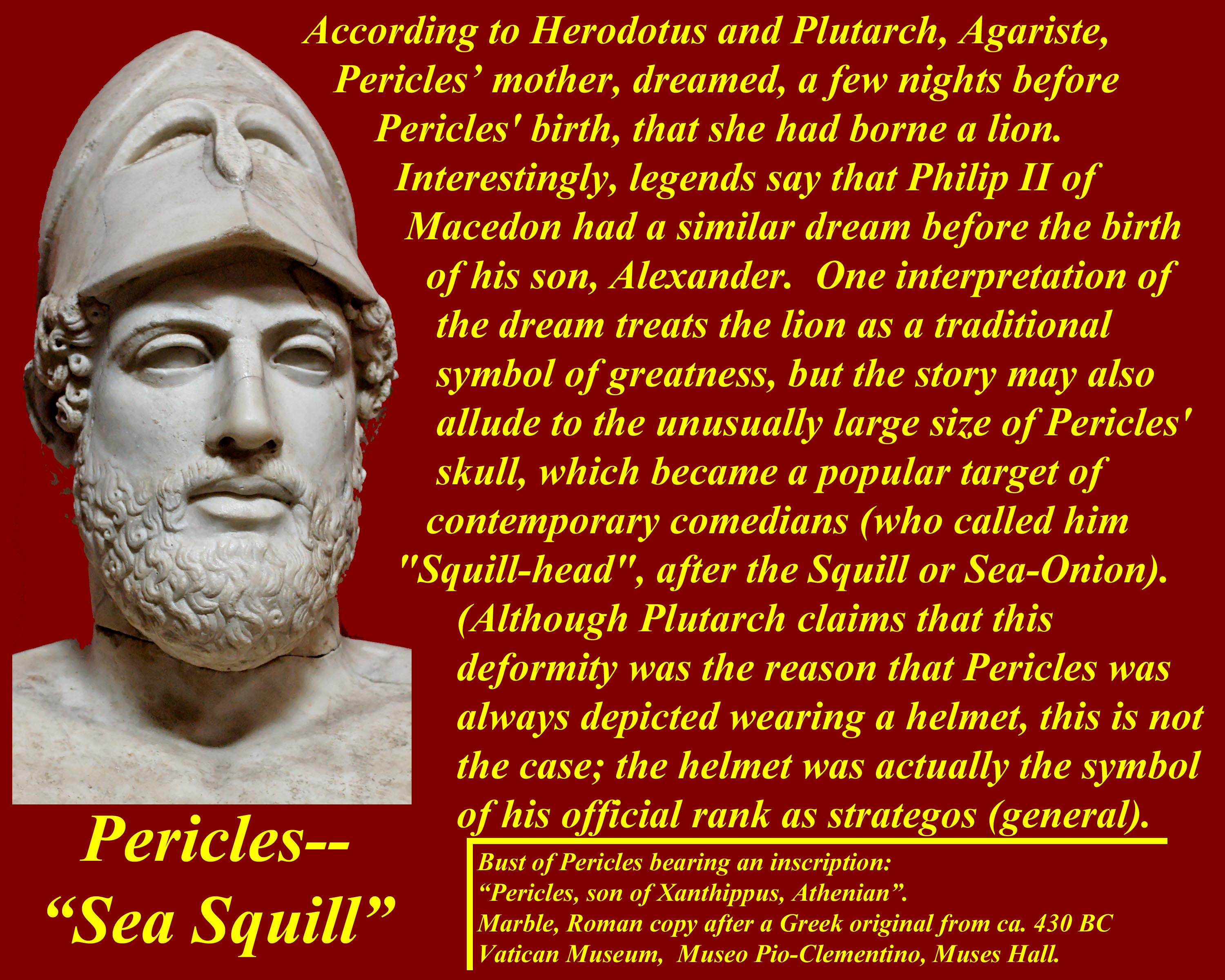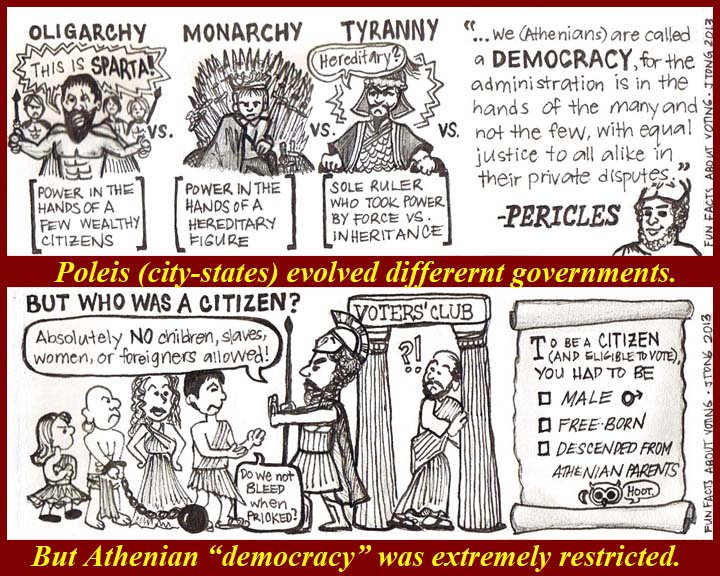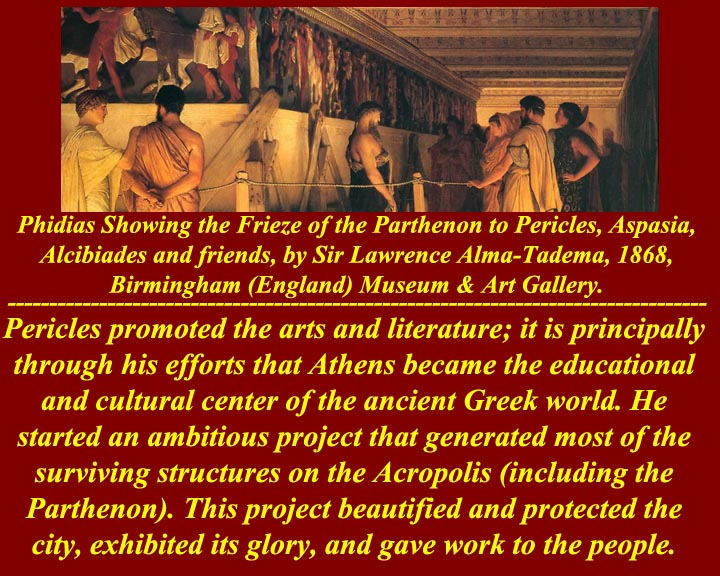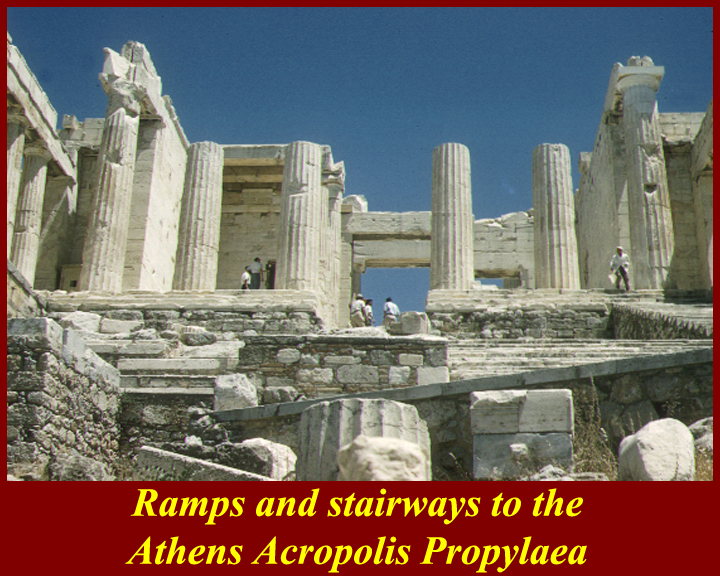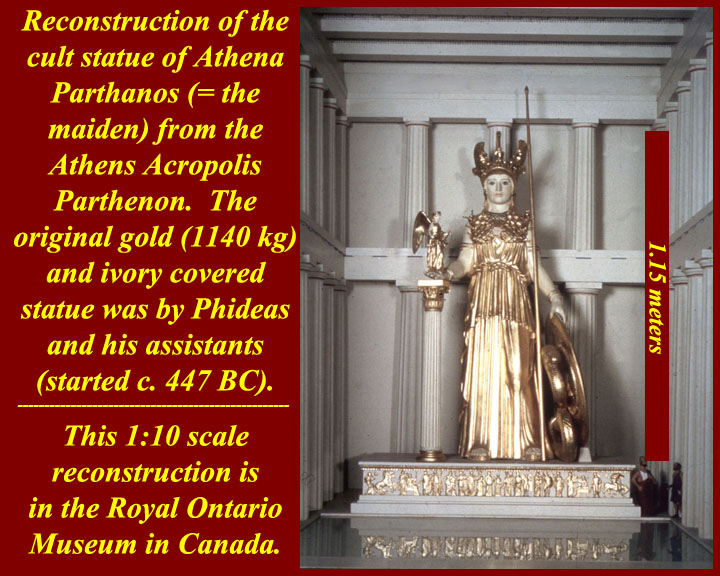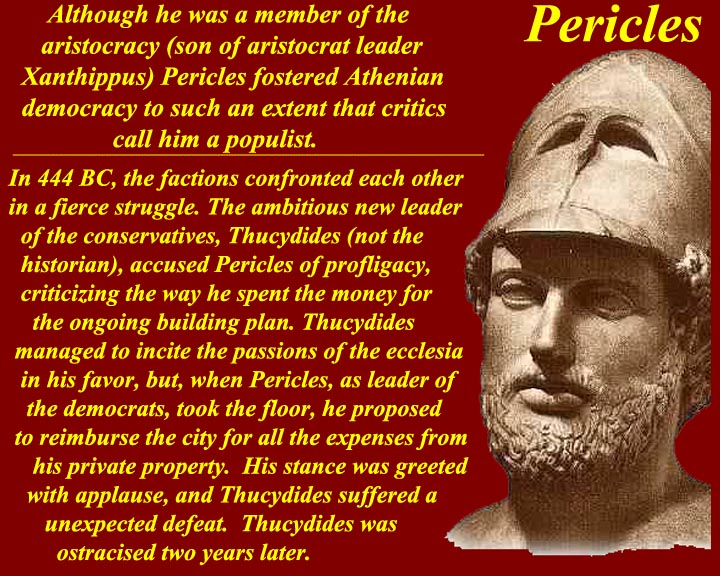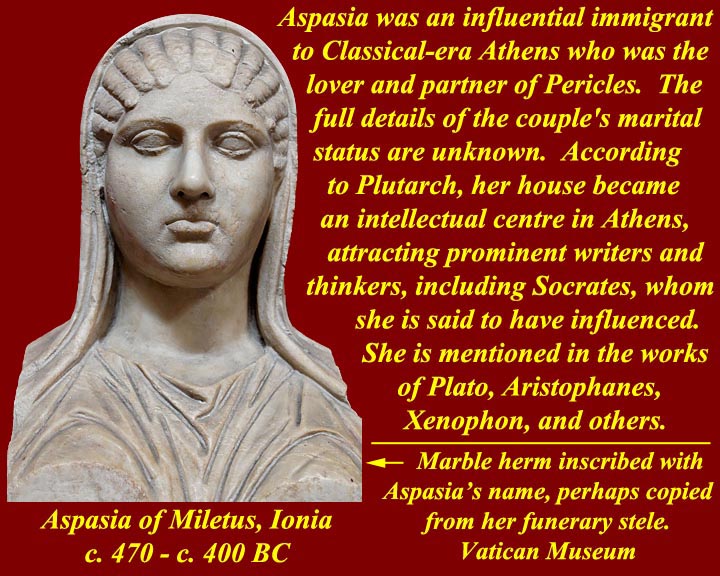Ancient Greece 2
Unit 13 -- Classical Athenian Politics: Aristoi v. Demos
Even before the end of the Archaic Period and before and during the Persian Wars, competition for power was endemic in Athens between Aristagogues and Demagogues.
Everyone knows what a demagogue is:
In most cases a Demagogue tries to portray him-/herself as a person of "the people" (the demos), but in more rare cases an aristocrat (i.e., a "best person") who wants
to advance the interests of "the people". Almost invariably, the demagogue is really just an aristocratic poseur seeking his or her own interests.
The word "aristocrat" comes directly from the Greek; "aristoi" (ἄριστοι), the label given to the noblemen in ancient Greek society, and in particular ancient Athens. The term literally means "best", with the denotation of best in terms of birth, rank, and nobility, but also usually possessing the connotation of also being the morally best.
Aristagogue (also aristogogue) is a more obscure term, and often an aristagogue is just considered another kind of demagogue -- but the audience to whom aristagogues address their appeals is of critical importance:
It is, of course, possible for an aristogogue to appeal to the demos: all he or she has to do is convince the demos that they are really the best and brightest or to convince them that there is a danger from below them either from newer arrivals or from aliens who have infiltrated (illegal aliens) or who might infiltrate into the "polis", i.e. the community at large. The aristogogue is then just another kind of demogogue.
The 2016 US presidential election campaign gives us examples of both demagogues and aristagogues. It is undeniable that all (yes, all) of the candidates that either the Republicans or the Democrats put forward are members of the wealthy "1%" and that all of them surely think of themselves as part of the moral 1%.
Who are the 1%
Ranking by Income
Ranking by Wealth
According to the Global Rich List, a website that brings awareness to worldwide income disparities, an income of $32,400 a year will allow you to make the cut. Using current exchange rates, that amounts to roughly:
29,100 euros
2.1 million Indian rupees, or
200,900 Chinese yuan
So if you’re an accountant, a registered nurse or even an elementary school teacher, congratulations. The average wage for any of these careers falls well within the top one percent worldwide.
The threshold is significantly higher if you look at the top percentile by wealth instead of income. To reach that status, you’d have to possess $770,000 in net worth, which includes everything from the equity in your home to the value of your car and investments (debt is subtracted). That’s equal to roughly:
692,000 euros
48.9 million Indian rupees or
4.8 million Chinese yuan
Debt: The typical U.S. household carries a whopping $70,000 in debt, according to the most recent Census Bureau data. Even so, many middle-class Americans who have spent years paying down their mortgages and saving for retirement belong to the 1% upper echelon of worldwide wealth.
Is that us?
At the beginning of the Classical period (ca. 478 BC), Athens was reeling from the destruction wrought by Xerxes and his Persian Empire armies. The shrines and temples of the Acropolis and the lower city had been systematically destroyed. But the Greeks won the war and the Athenian polis (i.e., the citizenry and their dependents who had hidden out in Salamis) moved back to Athens and quickly started to rebuild. The old Greek military alliance (led by Sparta) dissolved -- the Spartans withdrew, probably fearing to send their forces too far from home -- and a new (maritime) Dellian League, led by Athens, pursued the Persians back into their home territories.
The Dellian League (modern historians' name) turned out to be a cash cow for Athens, and Athens didn't hesitate to milk it. The Delian League, founded in 477 BC, was an association of Greek city-states, members numbering between 150 to 173, under the leadership of Athens, whose purpose was to continue fighting the Persian Empire after the Greek victory in the Battle of Plataea at the end of the Second Persian invasion of Greece. The League's modern name derives from its official meeting place, the island of Delos, where congresses were held in the temple and where the treasury stood until Pericles moved it to Athens in 454 BC.
Shortly after its inception, Athens began to use the League's navy for its own purposes. This behavior frequently led to conflict between Athens and the less powerful members of the League. By 431 BC, Athens' heavy-handed control of the Delian League prompted the outbreak of the Peloponnesian War.
But before that happened there were several rounds of internal Athenian class competitions led by Aristogogues and Demagogues.
---------------------------------------------------
The Acropolis destroyed:
Athenian major Aristogogues and Demagogues
Rome mirrors Athens -- from the start of the Roman Republic (509 BC), there was a similar competition ("fathers" = literally patricians -- or "old men", literally, senators -- v. plebians, the populus (= demos). The leaders of the Roman "best people" were "optimates" and the leaders of the rest (populus = the people / demos = mob) were the "populares". Just as in Athens, purported leaders of both factions were mostly from old patrician aristocratic families. Cicero and Pompey were optimati while Julius Caesar, Mark Antony, Cassius, Brutus, and Augustus, and all the subsequent emperors portrayed themselves as populares, but with less success as time went on. (Interestingly, Nero, Domitian, and Commodus, although hated by history, were all very successful at portraying themselves a populares.)
A false quotation:
No, he did not say it. See
https://www.monticello.org/site/jefferson/democracy-nothing-more-mob-rule
An early Greek (pre-Persian war) competition:
Isagoras (Greek: Ἰσαγόρας), son of Tisander, was an Athenian aristocrat in the late 6th century BC.
He remained in Athens during the tyranny of Hippias, but after Hippias was overthrown, he became involved in a struggle for power with Cleisthenes, a fellow aristocrat. In 508 BC he was elected archon eponymous, but Cleisthenes opposed him, with support from the majority of the population. Isagoras requested support from the Spartan king Cleomenes I, an old friend who had earlier been given hospitality by Isagoras. According to Herodotus, Cleomenes had had an affair with Isagoras' wife.
Isagoras, with Cleomenes' help, expelled Cleisthenes and other members of the Alcmaeonidae family on pretext of the ancient Alcmaeonidaean stain (= miasma. Megacles a distant ancestor had executed Athenians extrajudicially).
Cleisthenes' supporters and the ordinary Athenian citizens revolted against Isagoras' tyranny, and ended up trapping Isagoras and his Spartan allies on the Acropolis for two days. On the third day they made a truce, allowed Cleomenes and Isagoras to escape, and executed 300 of Isagoras' supporters. Cleisthenes then returned to the city and became archon in the democracy.
Preceded by Aristocracy under Cleisthenes. Succeeded by Athenian democracy under Cleisthenes.
https://en.wikipedia.org/wiki/Cleisthenes
The next round -- 480s BC, between the First and Second Persian wars:
Xanthippus (Greek: Ξάνθιππος; c. 525-475 BCE) was a wealthy Athenian politician and general during the early part of the 5th century BC. His name means "Yellow Horse". He was the father of Pericles. He is often associated with the Alcmaeonid clan. Although not born to the Alcmaeonidae, he married into the family when he wed Cleisthenes' niece Agariste, and would come to represent their interests in government. He distinguished himself in the Athenian political arena, championing the aristocratic party. His rivalry with Themistocles led to his ostracism, only to be recalled from exile when the Persians invaded Greece. He distinguished himself during the Greco-Persian Wars making a significant contribution to the victory of the Greeks and the subsequent ascendancy of the Athenian Empire.
https://en.wikipedia.org/wiki/Xanthippus
Aristedes (Greek: Ἀριστείδης, Aristeides; 530 BC – 468 BC) was an ancient Athenian statesman. Nicknamed "the Just", he flourished in the early quarter of Athens' Classical period and is remembered for his generalship in the Persian War. The ancient historian Herodotus cited him as "the best and most honourable man in Athens" and he received similarly reverent treatment in Plato's Socratic dialogues.
https://en.wikipedia.org/wiki/Aristides
and http://www.britannica.com/biography/Aristides-the-Just
Themistocles was often viewed unfavorably by early writers. Admittedly a master strategist, he is often depicted as a slick politician, bent on enriching himself even in the crisis of the great war. The reason for this bias is perhaps that he was a strong democrat, hated by the Athenian upper classes, and their views, passed on to their friend the historian Herodotus and to Plato, himself an aristocrat, color the whole tradition. Herodotus introduces him only at the onset of the crisis as “newly come to the front” (which is incorrect) and drops him from his story at the end of 480. Only the historian Thucydides does him justice and calls the darkest charges against him “alleged.”
http://www.britannica.com/biography/Themistocles
and https://en.wikipedia.org/wiki/Themistocles
460s BC Cimon (Kimon) v. Ephialtes and Pericles
https://en.wikipedia.org/wiki/Cimon
and http://www.britannica.com/biography/Cimon
and http://www.stoa.org/projects/demos/article_cimon?page=all
Nature intervenes -- the cause of Cimon's downfall was an earthquake in Sparta.
https://en.wikipedia.org/wiki/464_BC_Sparta_earthquake
and https://www.youtube.com/watch?v=1z1EUUdtlHo
The Spartan earthquake led to an Helot uprising that the Spartans were too weakened to quell without outside help. Cimon, the Spartophile Athenian politician, led a force of several thousand Athenian hoplites into the Peloponnese, but his help was ultimately refused by the fearful Spartans. Cimon led his troops back to Athens where his political enemies, Ephialtes and Pericles (a protege of Ephialtes) used his failure/disgrace in Sparta and reports that Sparta had agreed to help Thasos in its revolt against the Delian League (465 BC) to engineer Cimon's ostracism in 461.
http://www.stoa.org/projects/demos/article_ephialtes?page=all
and https://en.wikipedia.org/wiki/Ephialtes
Ephialtes Reforms -- take power from the areaopagites, give it to the boule and the popular courts:
http://www.perseus.tufts.edu/hopper/text?doc=Perseus%3Atext%3A1999.04.0009%3Achapter%3D9%3Asection%3D2%3Asubsection%3D2
Ephialtes' assassination gave power to Pericles. (Did Lyndon Johnson arrange the assassination of JFK?)
Not proven. But Pericles became the wundekind of Athenian Democracy.
Note that Athenian politician Pericles is not the Pericles about whom Shakespeare wrote (apparently with at least one inferior collaborator); Shakespeare wrote about a different Pericles, a "Prince of Tyre" who had numerous adventures and misadventures (so many, including a marriage riddle, misidentifications, incest, pirate capture, returns from apparent death, "and a bit about a dog") that the play, although played with a straight face, had an intended comedy "reception". For a full text, see http://shakespeare.mit.edu/pericles/full.html.
Shakespeare's play is thought to be the model for Volraire's comedy, Candide (https://www.gutenberg.org/files/19942/19942-h/19942-h.htm).
For a 2005 performance of Leonard Bernstein's hilarious musical adaptation of Voltaire's Candide, see https://www.youtube.com/watch?v=DO6I0G6kKz0.
https://en.wikipedia.org/wiki/Pericles
and http://www.ancient.eu/pericles/
and http://www.history.com/topics/ancient-history/pericles
http://www.encyclopedia.com/topic/Pericles.aspx
https://en.wikipedia.org/wiki/Drimia_maritima
In addition to carrying out the reforms of Ephialtes, Pericles added a few of his own: pay for jurymen (yes, only men), pay for public officials, and tightening citizenship requirements. The first two allowed more participation in government, but the tighter citizenship requirements (both parents had to be Athenian if you wanted to be a citizen rather than the previous either parent) seems pretty undemocratic -- despite what apologists say about increasing identity pride among those who remained citizens.)
Paid Jury Duty -- the situation today for jurors in the US is drastically different from the situation in Pericles' Athens, where jurors were paid enough to make jury duty an attractive alternative to going to work.
Jury duty most jurisdictions in the US can mean financial ruin. Jury duty avoidance is rife especially among the not-rich, and fairness in trials is threatened.
See http://reverbpress.com/justice/how-low-jury-duty-pay-threatens-our-justice-system/#$$o2r68l&&GbhwZtZiEeWIoQos2fzWfQ$$
After Pericles tightened citizenship requirements:
The image is not completely accurate -- women could be citizens, but female citizens had no participatory rights. The bottom part should be labeled "But who is a voter/potential office-holder".
---------------------------------
Pericles presided over a vast building/reconstruction effort to remedy the losses and destruction of the Persian wars. He paid for it with money misappropriated from the Delian League treasury -- and to make it easier he translated the League treasury from Delos to the Athens Acropolis. ("Translated" is a bit of historical jargon from Latin that means fransfered. See http://www.verbix.com/webverbix/go.php?D1=9&H1=109&T1=transfero.)
Pericles' pride and joy:
The next unit will cover Pericles' building program and the flowering of Classical Greek architecture in more detail.
--------------------------------------------
Woman behind the man -- Aspasia
"Pericles, following Athenian custom, was first married to one of his closest relatives, with whom he had two sons, Paralus and Xanthippus, but around 445 BC, Pericles divorced his wife. He offered her to another husband, with the agreement of her male relatives. The name of his first wife is not known; the only information about her is that she was the wife of Hipponicus, before being married to Pericles, and the mother of Callias from this first marriage.
"The woman whom he really adored was Aspasia of Miletus. She became Pericles' mistress and they began to live together as if they were married. This relationship aroused many reactions and even Pericles' own son, Xanthippus, who had political ambitions, did not hesitate to slander his father. Nonetheless, these persecutions did not undermine Pericles' morale, although he had to burst into tears in order to protect his beloved Aspasia when she was accused of corrupting Athenian society. His greatest personal tragedy was the death of his sister and of both his legitimate sons, Xanthippus and Paralus, all affected by the (430 BC) epidemic, a calamity he never managed to overcome. Just before his death, the Athenians allowed a change in the law of 451 BC that made his half-Athenian son with Aspasia, Pericles the Younger, a citizen and legitimate heir, a decision all the more striking considering that Pericles himself had proposed the law confining citizenship to those of Athenian parentage on both sides." [From https://en.wikipedia.org/wiki/Pericles#Personal_life.]
http://penelope.uchicago.edu/~grout/encyclopaedia_romana/greece/hetairai/aspasia.html
and http://penelope.uchicago.edu/~grout/encyclopaedia_romana/greece/hetairai/hetairai.html
--------------------------
Direct Participatory Democracy -- It only occurs in a few isolated places.
Below is an image of the Landsgemeinde in Glarus, Switzerland.
https://en.wikipedia.org/wiki/Landsgemeinde

